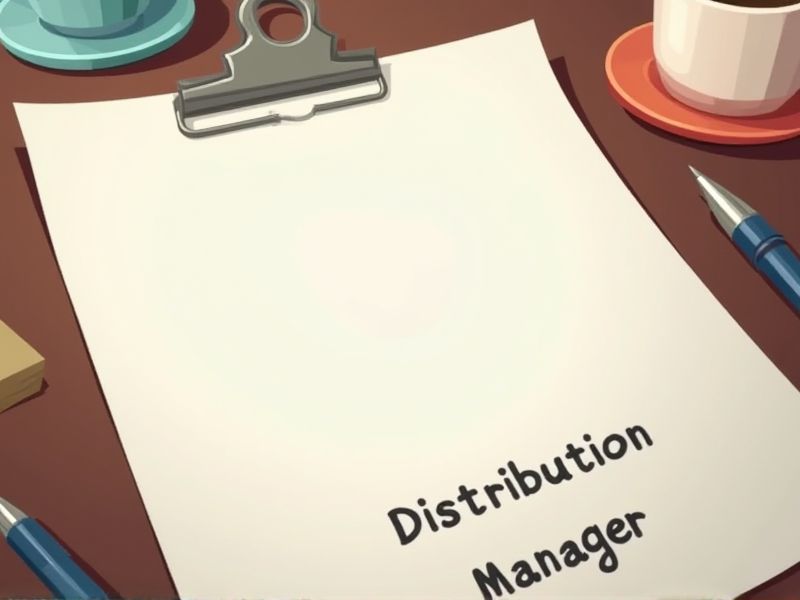
The role of a Distribution Manager requires a deep understanding of logistics, inventory control, and warehousing operations. Certifications in these areas equip managers with the necessary skills to optimize supply chain efficiency and reduce costs. Credentials can also enhance a manager's ability to effectively lead teams and implement best practices in distribution management. Here are key certifications that could be essential for a Distribution Manager.
APICS Certified Supply Chain Professional (CSCP)
The APICS Certified Supply Chain Professional (CSCP) certification equips distribution managers with a comprehensive understanding of global supply chain management, which is critical for optimizing distribution operations. Acquiring CSCP validates the manager's expertise in integrating and managing supply chain activities, ensuring efficient product flow and service delivery. Certification assists in aligning distribution strategies with overall business goals, enhancing the ability to handle complexities and disruptions in the supply chain. Possessing a CSCP credential can lead to improved decision-making skills, resulting in cost reduction and increased customer satisfaction.
APICS Certified in Logistics, Transportation and Distribution (CLTD)
Companies seeking efficiency and cost reduction in logistics operations benefit from managers with APICS CLTD certification as it provides the latest best practices. The certification enables managers to enhance their strategic decision-making, directly impacting supply chain optimization. Knowledge from the certification improves the ability to oversee complex global distribution networks, crucial for competitive advantage. It reinforces understanding of core logistics concepts and increases capability to foster sustainability and compliance in distribution operations.
APICS Certified in Production and Inventory Management (CPIM)
A distribution manager's role often involves ensuring efficient workflow and inventory management, which the APICS CPIM certification covers comprehensively. Obtaining this certification equips managers with in-depth knowledge of production and inventory processes, enabling them to enhance operational efficiency and reduce costs. Training from CPIM provides them with tools to forecast demand accurately, mitigate supply chain risks, and optimize stock levels. This certification also gives managers a competitive edge in the job market, reinforcing their expertise in distribution logistics and supply chain management.
Lean Six Sigma Green Belt Certification
Lean Six Sigma Green Belt Certification equips Distribution Managers with the skills to identify inefficiencies in supply chain processes, leading to cost reduction and improved service delivery. By applying data-driven methodologies, these managers can enhance operational efficiency and reduce waste, fostering a more streamlined logistics operation. The certification also instills a culture of continuous improvement, essential for adapting to dynamic market demands. Possessing this qualification often distinguishes managers in a competitive job market, signaling expertise in quality management and process optimization.
Lean Six Sigma Black Belt Certification
Lean Six Sigma Black Belt Certification equips distribution managers with advanced problem-solving skills, enhancing efficiency in logistics operations. When distribution managers apply Lean Six Sigma principles, they can effectively reduce errors and waste, leading to cost savings. Acquiring this certification enables managers to implement process improvements that increase customer satisfaction by ensuring timely and accurate deliveries. Certification also provides a competitive edge in the job market, as companies seek professionals capable of driving operational excellence.
Certified Professional in Supply Management (CPSM)
Certified Professional in Supply Management (CPSM) enhances a distribution manager's ability to streamline procurement and logistics, leading to reduced operational costs. This certification equips managers with strategies that optimize supply chain efficiency, improving delivery times and customer satisfaction. Knowledge gained from CPSM ensures compliance with global supply chain standards, minimizing legal and regulatory risks. CPSM fosters skills in supplier relationship management, crucial for negotiating better terms and ensuring consistent product availability.
Project Management Professional (PMP)
PMP certification equips distribution managers with standardized project management skills, enhancing their ability to oversee complex logistics projects efficiently. Notably, distribution managers often face multifaceted supply chain challenges; PMP credentials provide frameworks for risk management, ensuring smoother operations. The structured processes and methodologies learned through PMP lead to improved resource allocation and time management, important in dynamic distribution environments. As supply chains continue to evolve with globalization and technological advancements, PMP ensures managers remain competitive and capable of meeting emerging industry demands.
CSCMP SCPro Certification
The CSCMP SCPro Certification enhances a distribution manager's understanding of end-to-end supply chain processes, leading to more efficient operations. This certification validates expertise in supply chain management, often resulting in increased job opportunities and career advancement. The structured learning and assessments involved ensure the distribution manager stays updated with the latest industry trends and practices. Being SCPro certified can improve decision-making skills and lead to optimized resource allocation, impacting overall productivity and cost efficiency.
Certified Distribution Professional (CDP)
A Certified Distribution Professional (CDP) enhances a distribution manager's expertise by providing industry-recognized credentials that validate their skills. The certification often leads to improved operational efficiency, as certified managers are trained in best practices and advanced strategies. CDP credential holders typically gain better insights into supply chain logistics, resulting in more effective inventory management. Many organizations prefer or require certification for leadership roles to ensure adherence to industry standards and to foster trust among stakeholders.
Supply Chain Manager Certification (SCMC)
A Supply Chain Manager Certification (SCMC) equips distribution managers with enhanced strategic management skills, ensuring efficient coordination across supply chain activities. Possessing this certification signifies a deep understanding of logistics, which helps in minimizing operational bottlenecks and maximizing distribution effectiveness. It enhances the credibility and qualifications of distribution managers, fostering trust in their ability to lead complex supply operations. Certified managers often have access to a broader network of industry professionals, facilitating improved collaboration and knowledge-sharing opportunities.
Summary
With a distribution manager obtaining certifications, you can anticipate improved operational efficiency within the supply chain. Certifications often lead to enhanced skills and knowledge, directly impacting decision-making processes. The manager's credibility increases, which fosters better relationships with vendors and stakeholders. As a result, overall organizational productivity and customer satisfaction levels see significant advancements.
